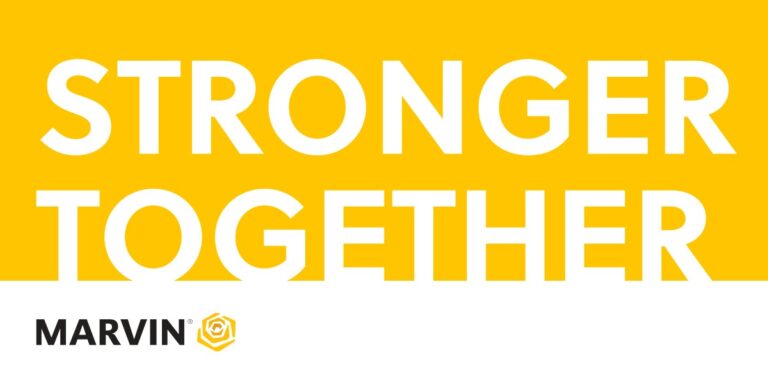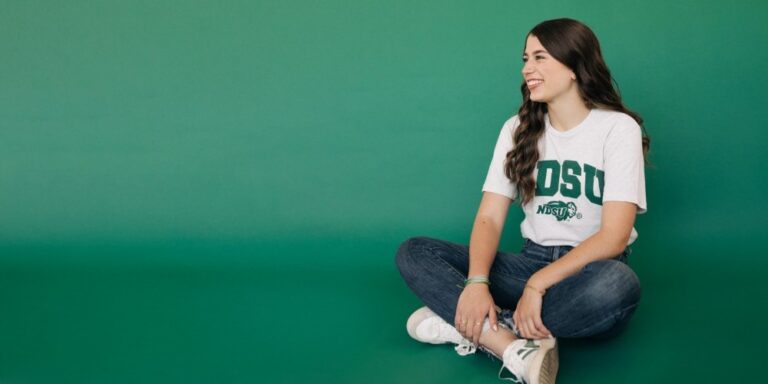Marvin’s partnership with NDSU is a testament to the power of community, innovation, and the belief that anything is possible.
Read MoreQ&A with the Cooks
On Tuesday, May 24, 2022, NDSU's 15th president, Dave Cook, along with Dr. Katie Cook, visited with NDSU Foundation president and CEO, John Glover, at the McGovern Alumni Center along with alumni and friends of the University and community leaders. The conversation covered topics ranging from President Cook's academic journey and his time abroad, to how parenthood influences his perspective as a university president, how Katie sees her role, and what they're most looking forward to as they join the Bison Family.
Transcribed by Nicole Thom-Arens | June 16, 2022
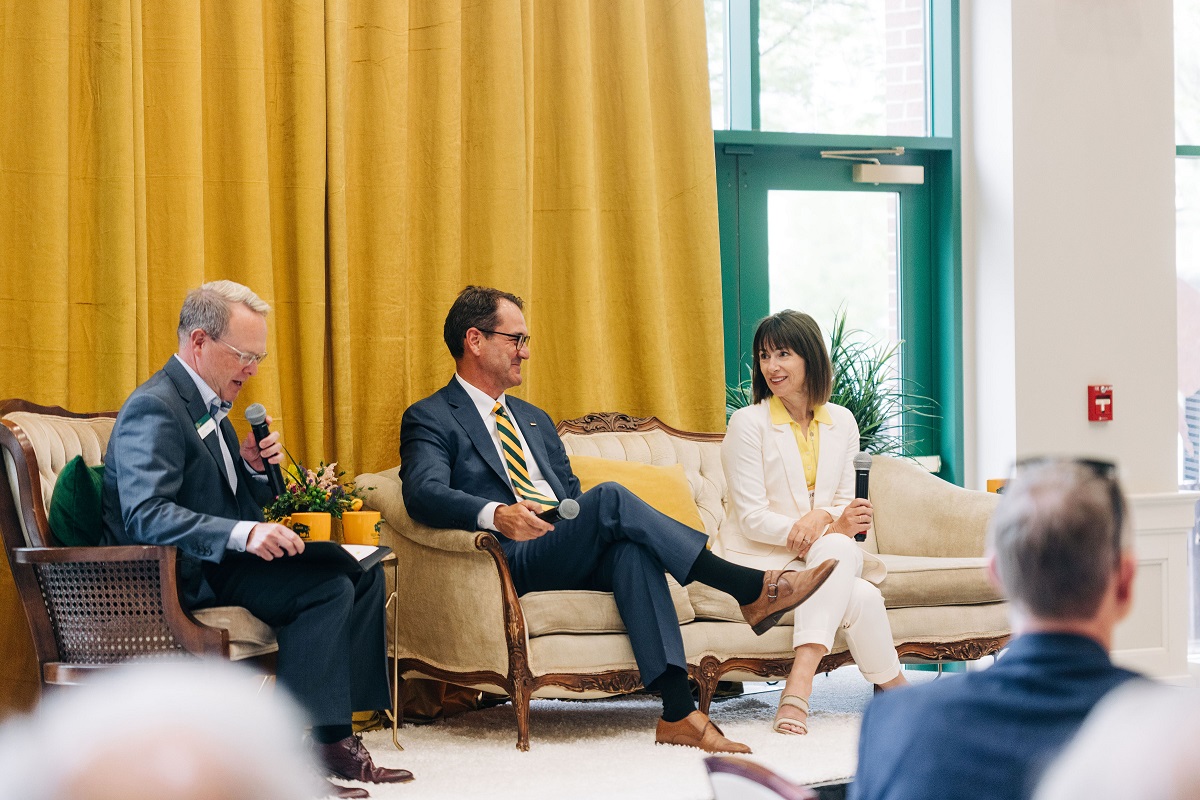
John Glover (J.G.): Dave, welcome. You’re the 15th president of North Dakota State and you’ve been on the job for a week. What are your early reflections, observations, and thoughts?
D.C.: I have to say, this is incredibly humbling. The thing that I think I’ve said over and over again is I just love the people, and it’s really true. Katie and I got on the plane home after the interview, and we were sort of like, “What just happened?” We really enjoyed meeting everybody. They were so good to us, so welcoming, so proud of the institution, very genuine, and that has been a common theme over and over again. It’s special, and it’s a big part of the reason why we walked away from here a few of months ago thinking we could really fall in love with this place.
J.G.: I think many of us, in reading your bio and background know that you grew up in Ames, Iowa, and graduated from Iowa State University. Talk a little bit about the education and preparation that you had at another land-grant university here in the Midwest and how that has prepared you to be president of NDSU.
D.C.: Katie and I both grew up in Ames and still have family there in Iowa. My experience was growing up in a college town; I love college towns. There’s just something about the energy and the passion. I’ve always kind of had an affinity for all of that and always knew I wanted to do something in higher ed.
The other part of the story is that even though I grew up in a college town, and it was right there in front of me, my mom and dad didn’t go to college. I didn’t quite get it. I didn’t know what it was. I showed up the first day, and one of my many bad jokes, is they handed out a syllabus — you all know what the syllabus is — I didn’t. I sat there and thought, “Oh my God, I don’t belong here.” I kind of just struggled through it a little bit.
Maybe my mom and dad didn’t teach me about higher education, but they taught me a lot of other things like hard work and tenacity and that just kind of grounded me. I did a little bit of a grind and got through that, and for whatever reason, I thought, “Well, maybe I want to go to graduate school.” And it was just the same old story all over again. Somewhere along the line, I always kind of figured it out.
Because of those experiences, I’m going to work a little harder for the first generation and the students of color and the Pell Grant-eligible students who, you know, aren’t sure if they belong and do what I can to make sure that they know that they belong.
J.G.: Talk a little bit about your graduate work. You pursued a doctorate in organizational communication, and you spent some time doing research in Shanghai, China. So, here’s a kid from Ames, Iowa, who really didn’t know what a syllabus was, and you find yourself on the other side of the planet. How did that shape your own academic research, organizational and global view of society, and how might that influence your role as president?
D.C.: I really do think education changes lives. That’s why I’m in this business. And for me, getting to go to Shanghai is one of those things that was life changing. Somewhere along the line in graduate school, I ran into a professor who I think really changed my life. He introduced me to a kind of intercultural cross-cultural communication, business communication, and working across the globe. That became a real passion.
If I’m applying that to the current job, I’m thinking about having a global mindset. We’re here in Fargo, but we know how small the world has become and our students need to understand where they fit.
As president, I’m going to care about how we recruit internationally, allowing our students and our community to better appreciate all the different mindsets, and then maybe our students will want to study abroad. Helping them prepare for a whole big world that’s out there is really important.
J.G: You have spent, up until now, your entire academic and administration career at the University of Kansas. Reflect on that journey and how working on both sides of the university as a tenured faculty member and in administration has informed you for a role like this.
D.C.: I have spent 20 plus years at the University of Kansas and went to graduate school there. I was coming back from Shanghai, and the person that I had done a lot of research with was in something called the Center for Telemedicine and Telehealth. I started running a research center, became a faculty member in a school of medicine, and I got tenure there, which is kind of cool when you’re a social scientist and you’re getting tenure at a school of medicine. They didn’t quite know what to think of me, but I spent 14 years there.
I started with telemedicine. That was great. Cancer was the number one priority, so I ended up running something called the Midwest Cancer Alliance where we created a clinical trial network across the state — both rural and all the rest. We wanted to start something called a School of Public Health, so I designed it, at least on paper. There are great opportunities to do that kind of work here in North Dakota.
From there, I did an American Council on Education Fellowship, which is a higher ed fellowship. I spent a year at the University of North Carolina Chapel Hill studying higher ed leadership and basically crisscrossed the nation. It was like going back to graduate school. That was a lot of fun. I went South Africa for a month, with Katie’s blessing. I came back, ran a branch campus in Kansas City, right in the heart of all the economic development — areas that frankly would be like Fargo.
The last couple of years at KU, I’ve been working as the right hand to the chancellor doing public affairs, state and federal relations, all the communication work, and all the external affairs and economic development. I was the guy who would be right there with the chancellor, who is the head of the university, engaging with all of our external clients and stakeholders and all the rest. And candidly, I learned how to lead through the most difficult of times.
When COVID hit, I was at the Big 12 tournament, and over the course of two or three hours, I watched the Big 12 basketball tournament be cancelled; I watched how they were negotiating what they were going to do with the NCAA tournament and ultimately how it went away. I wondered what I had gotten myself into, but I did learn a lot from a great leader in terms of how to handle hard situations, how to stay even keel, and ultimately how to be successful. I think that prepared me to take this next step, and so I’m very grateful for that.
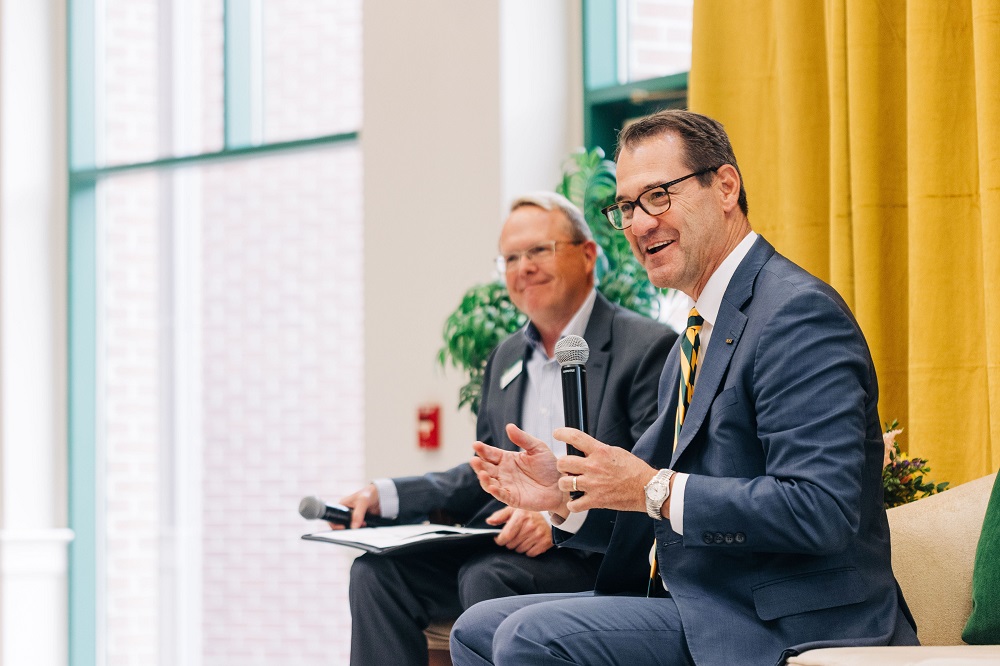
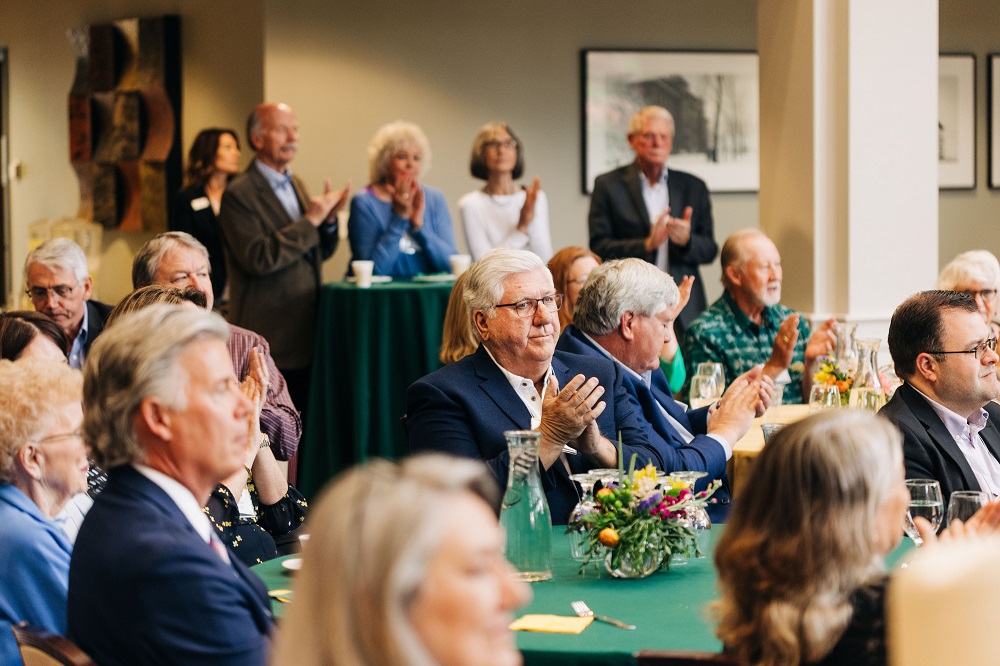
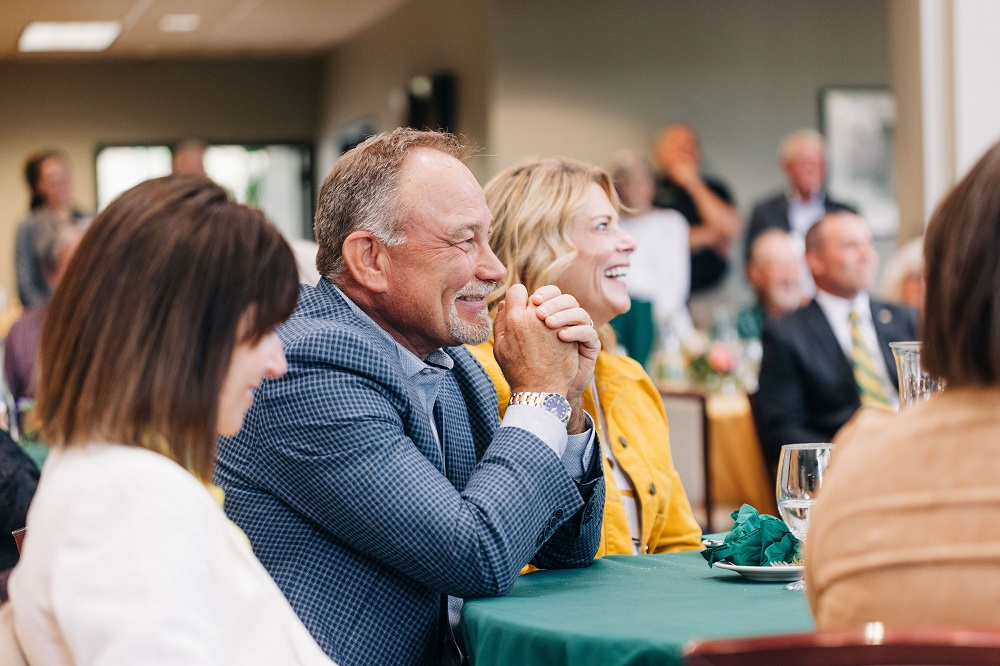
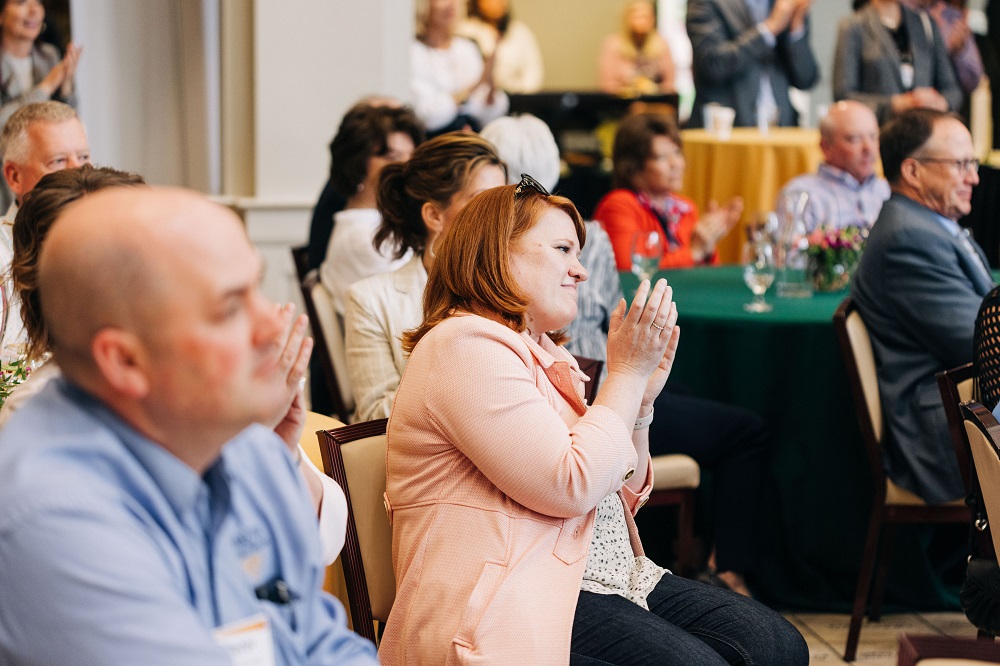
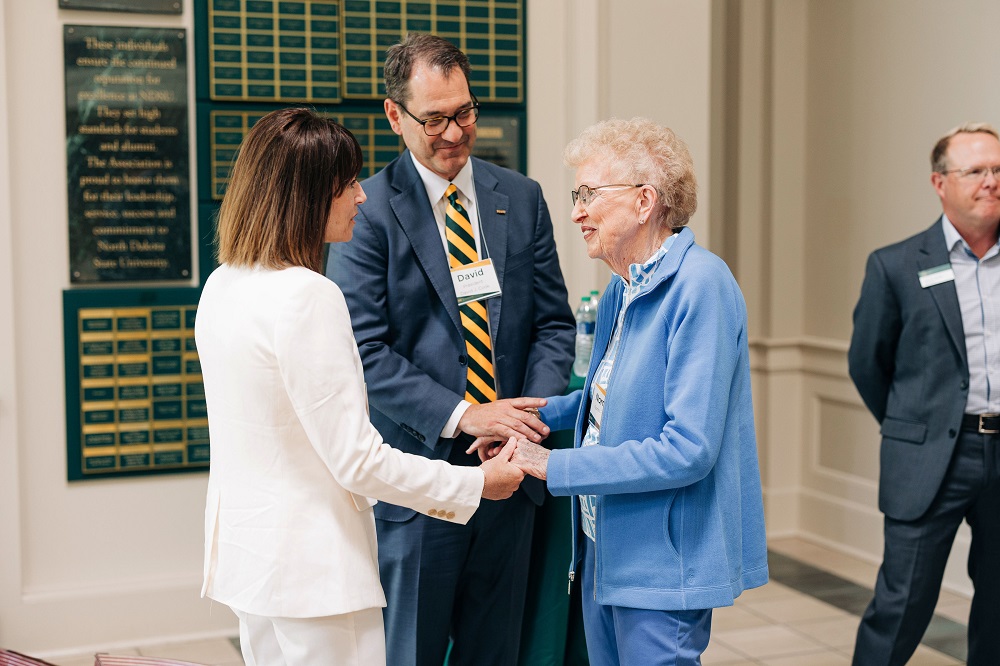
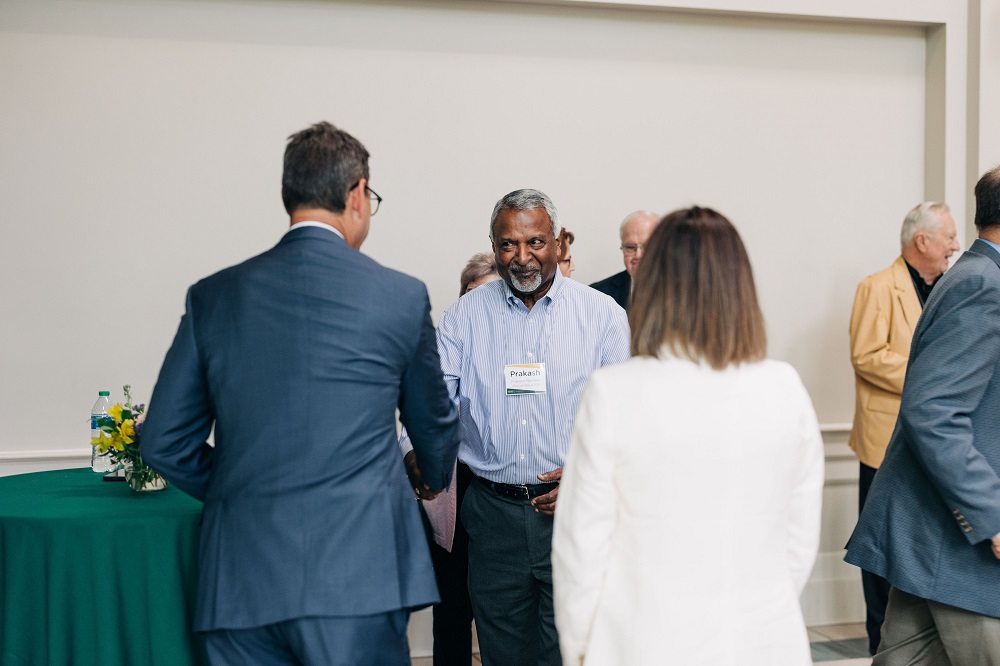
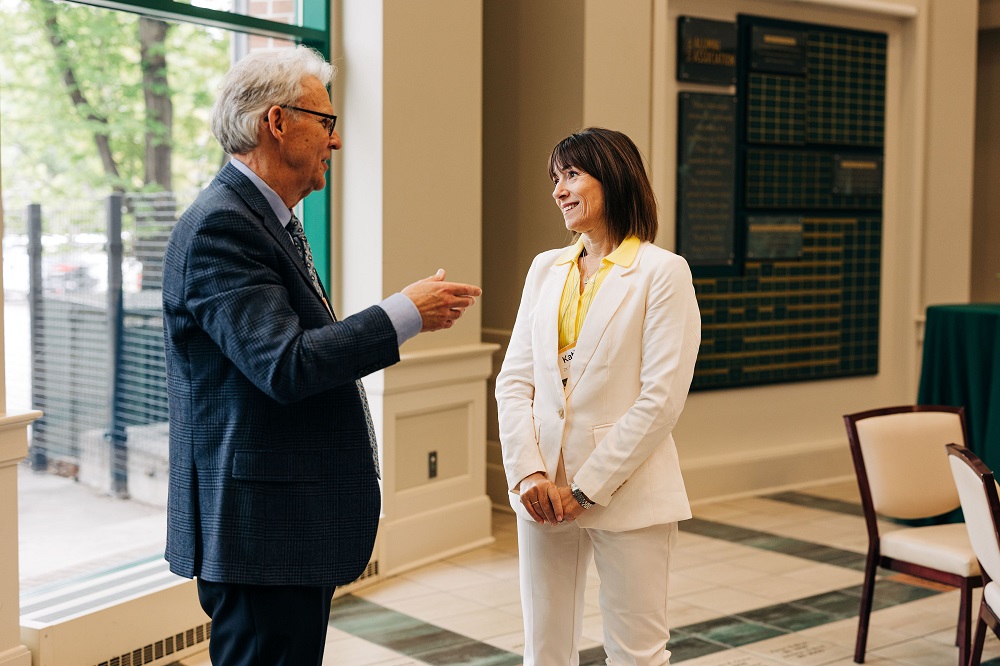
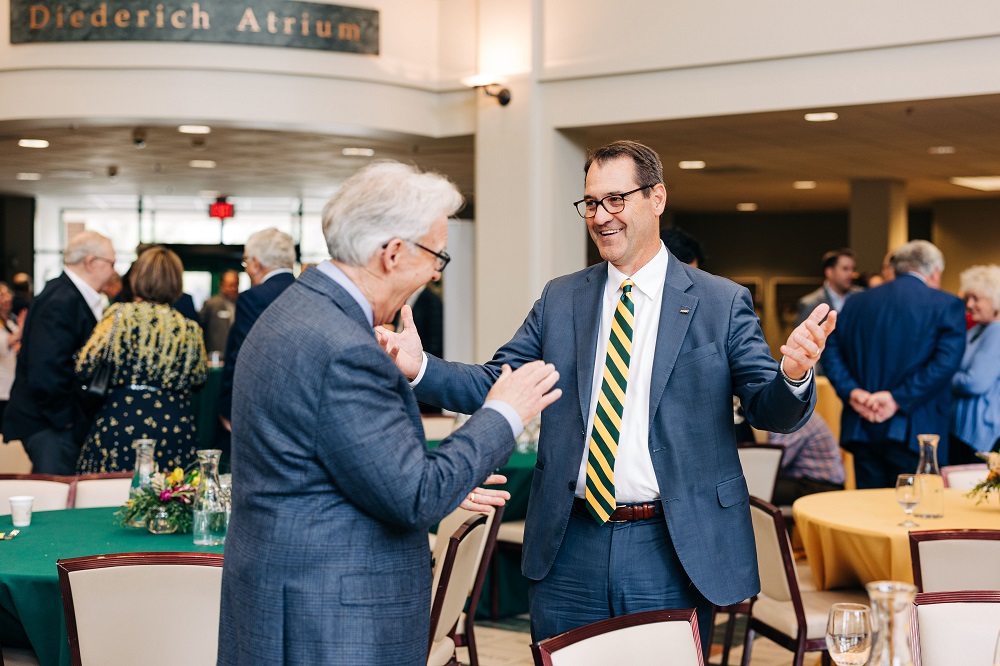
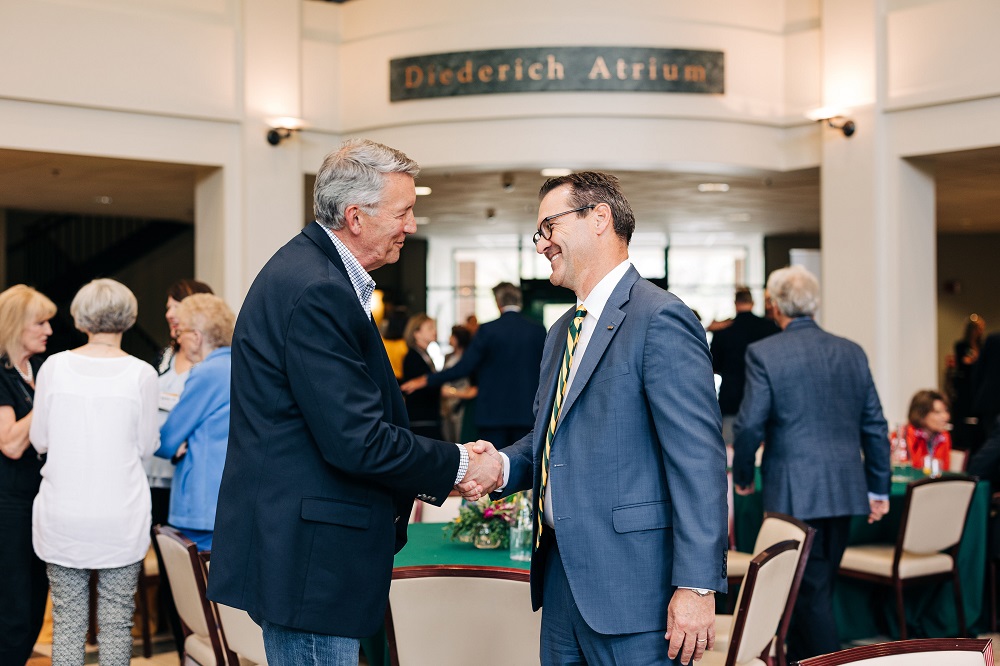
President Dave Cook and Dr. Katie Cook met and visited with NDSU alumni and friends at the McGovern Alumni Center in May 2022.
J.G.: A little bit on the personal side, what would you identify as a defining characteristic or attribute of yours and how that will shape or influence your role as president?
D.C.: I pride myself on this — I’m a really good listener. I spent nearly 200 hours before day one meeting with people from NDSU. I have a deep appreciation for President Bresciani and the leadership team here. People allowed me to get started before I got started. I want to learn as much as I can. I’ve been listening, I’ve been learning, I’ve got a lot of ideas, but I still think there’s still a lot more of that to come. I’ve always believed in surrounding myself with great people, asking a lot of questions, and listening, so that’s what I’m going to lean on a lot here in the early days of this role.
J.G.: You and Katie have three children. One living in Nashville and two who are still in college. Talk a little bit about how having college-aged children shapes or influences the way you think about the university.
D.C.: I think it’s really important. They’ve grown up in a completely different world than we’re used to. There are significant challenges around mental health, and the world around us now is way different than the world that we’ve dealt with as college students.
We just so happened to have three kids who are very different, too, and so their journeys are really unique and interesting. Seeing what they’ve had to deal with, what their struggles are, what’s exciting to them, how they view the world, what they see as the possibilities, and all the rest are a big part of helping me, I think, do this job and hopefully do it better moving forward. I’m grateful for that.
J.G.: At this early juncture, what is emerging as a top priority or two or three things that you’re thinking most about for the future of the university in your leadership?
D.C.: I’ve got a lot more to learn. I’ve got to listen. I’ve got to hear what everybody’s ideas are. The 200 hours before I got here have given me a lot of ideas in terms of where I need to focus my time or what I think those priorities are, but I still have a lot more to do.
That said, anywhere you go in higher ed, especially in the Midwest, enrollment is one of those things we’re going to have to focus on. I think we have great team, great people doing some great work. There are a lot of opportunities or potential to do different things.
The fact we are an R1 is really cool. People do amazing work across a lot of different disciplines in this space, so that’s going to be something I want to understand better, see what the possibilities are, see where we can invest, and think about research globally.
My bias in the world around research is toward research that makes an impact. I have an economic development background a little bit, so I think about where we work with business and industry and how we maximize in that space. I’m a strong believer that the future of higher education will be determined based on how we work with business and industry and come together to think about things like the workforce. We are a land-grant; we serve the whole state.
One of the great things about this institution is the legacy of athletics. It’s hard for me to fathom how great we’ve been — in all of the sports. It’s pretty amazing. I think what athletics does for the brand, what it does for the pride, what it does for the institution is going to be really critical.
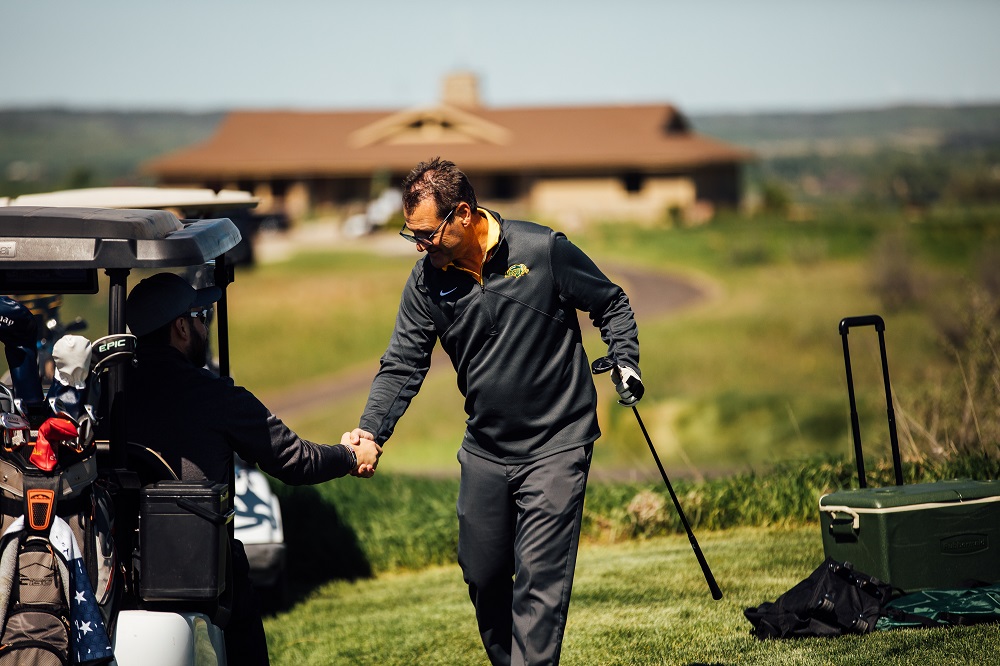
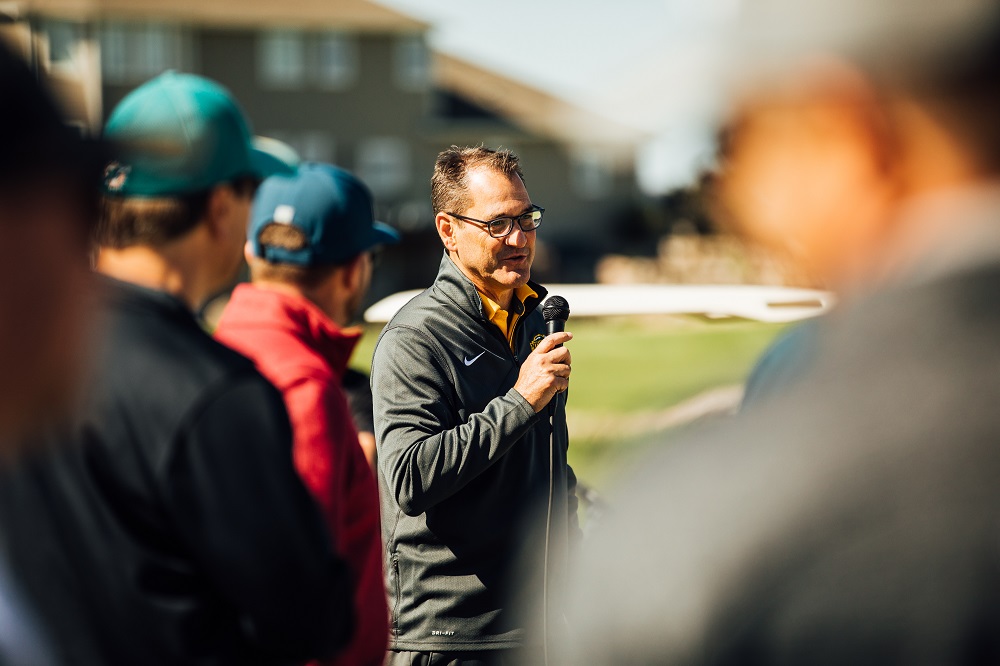
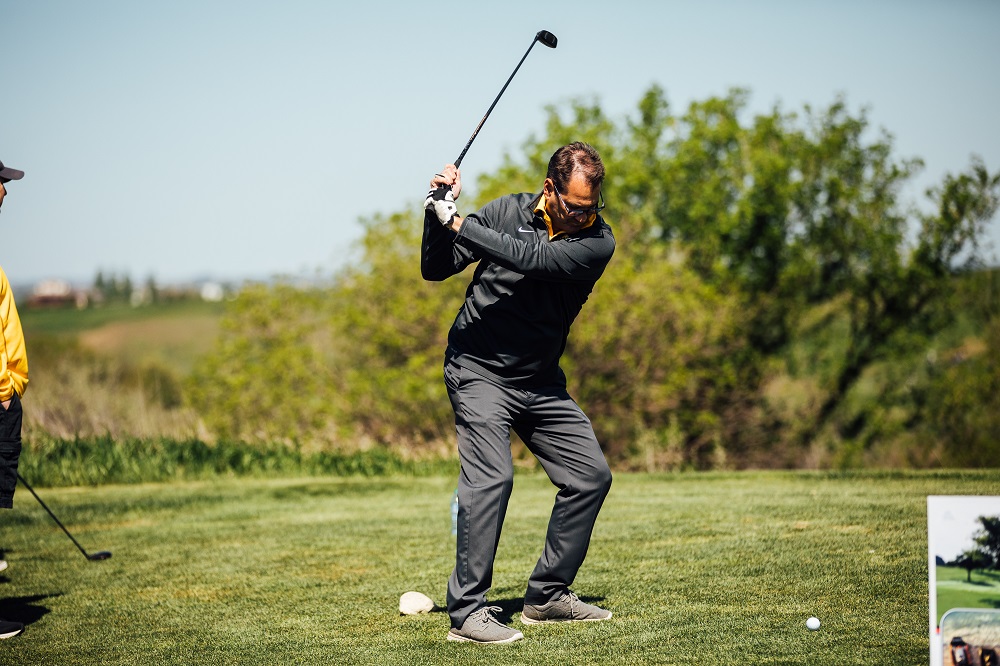
President Cook attended the NDSU Golf Tournament in Bismarck, North Dakota, in June 2022.
J.G: Thank you, President Cook. Let’s welcome Dr. Katie Cook up, please join us. Great to see you again. Welcome back.
Katie Cook (K.C.): Thank you. I’m very, very happy to be here.
J.G.: So, Katie, tell us a little bit about yourself, growing up in Ames, and your journey up to this point — meeting Dave and your own professional career?
K.C.: As you said, I grew up in Ames. Dave and I met in Ames. Sometimes that’s a good thing to know somebody so long and other times you kind of wonder how you know someone so long. My freshman year of college, I had spent in Minnesota at St. Cloud State University. I was pre-occupational therapy, and for some reason when I was there — back to that feeling you don’t think you can belong — I had a faculty member who made me think I could not be an occupational therapist, and I lost confidence in myself. I went to Iowa State. It was probably a really, really good thing and I became a special educator.
Everything I do, I do with passion — sometimes a little too much. I took the very, very first teaching job that I was offered, and it happened to be in Kansas where Dave was. While teaching in that position, I started realizing that there’s so much I didn’t know. I loved it, but I felt really incompetent. I grew up in a very middle-class community. That’s how I was prepared to educate, but I was not teaching in that kind of community, and I was very unprepared, so I decided to go back to graduate school.
I found that KU had a master’s degree in autism and that was it. That’s where I found my people. I was on an amazing grant there that gave me incredible, incredible opportunities.
Following that, I worked on a challenging behavior support team where we traveled the state of Kansas, which is a very rural area and very similar in a lot of ways to North Dakota. We’d go out to western Kansas and spend a couple of weeks and help guide teams of educators who had children with really significant disabilities, which was incredible.
From that experience, again, I felt like I didn’t know what I needed to know, so I decided to look at going for my Ph.D. At one time, I thought, there’s no way I was going to take that journey. But, I didn’t know what I needed to know to do the job that I needed to do. At that point, I had found faculty members who were really encouraging and really passionate and made me think that I could do this, so I went for my doctorate. It was an incredible experience.
I hope that in supporting Dave in this role we can help students get connected, so that while they’re working on their education, they can have those real-life opportunities because that’s where the education piece and what you’re learning really make a difference. That’s a critical piece that I’ve always been a voice for, and I will continue to be a voice for that. You’ll see we banter a lot. But, you know, I’m an educator and he’s an administrator. And I will come home and remind him that the administrators don’t always know everything, so I’ll keep him grounded in that place.
After I completed my doctorate, I got recruited to be faculty at KU. It was an incredible experience being at an R1. It was a lot different attending KU than being a faculty member at KU. At some point, I realized two things: one, I really, really missed my hands on opportunities with the students. I was still in schools, but not as much as I wanted to be in schools. Two, we also had young children, and all of a sudden, they started having activities. I was only teaching night courses, so we made a choice, and I left higher ed and went back to K-12. I’ve never regretted it. It’s a fabulous place to be.
J.G.: Katie, one of the most common questions I’m getting is what’s Katie going to do? Any early thoughts or reflections, once you close up shop in Kansas City and arrive in Fargo?
K.C.: You know, I think that’s an excellent question. I don’t have the exact answer. You know, I have heard from many people, “What is the first lady?” I don’t know. I have watched other people in this role. I want to be a presence. I want to help support and guide Dave in any way that I think I can have a voice. I want to be a partner with the community and with the students. My passions are anything related to animals and working with individuals with disabilities. And I see with the Bison Strides program that there are other opportunities here where I feel like I can just be in my place, and so I’m going to take any opportunity to kind of bridge those areas.
I think it’s going to be talking to people on campus, talking to people in the community and asking, “What do you want from somebody in this role?” “How can I build a bridge?” “What are you looking for?” I think it’s something that we’re going to create together. Probably at times I’m not going to do it perfectly or as you would like me to, so please be honest with me. I want us to be transparent. I want to do the best that I can to bridge the community, the university, and us.
J.G.: Dave, some closing comments for today?
D.C.: I’m truly humbled that you’re all here and supporting the institution. It was very clear to both of us early on the deep passion from the alumni, employees, everybody who works for the university have for NDSU. Whoever would have become the president, you were all in to make them successful because you care so much about the university. That was one of those things that came through loud and clear. I have enjoyed meeting everybody and look forward to really building lasting relationships with all of you. Thank you for your time and commitment and for everything you’re doing for us.
Share This Story
Related Stories
Success: A Team Project
With support, Caryn Marty ’26 is empowered to say “yes” to all the possibilities NDSU has to offer.
Read More